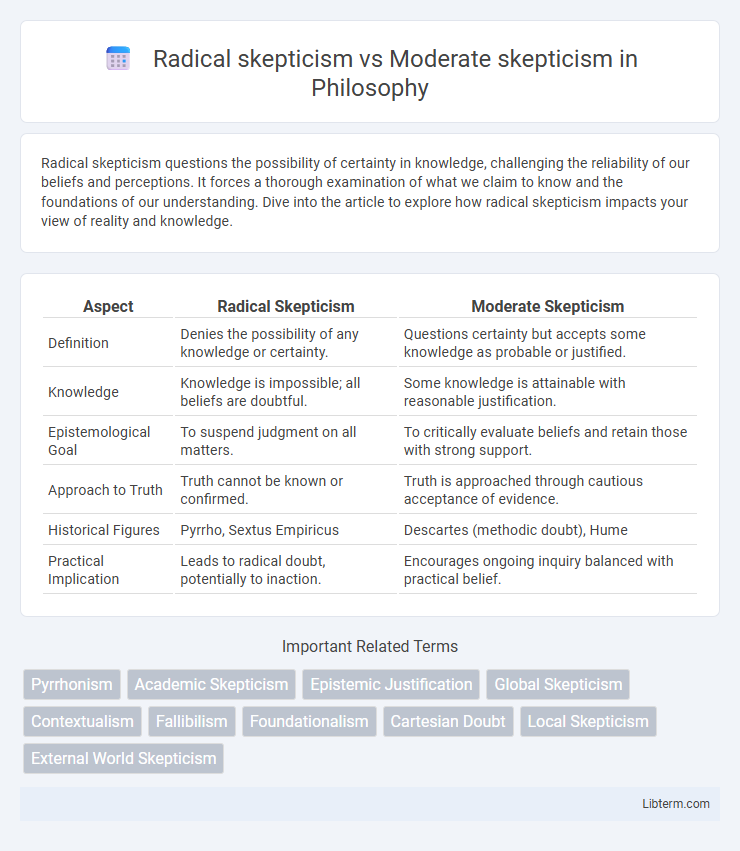Radical skepticism questions the possibility of certainty in knowledge, challenging the reliability of our beliefs and perceptions. It forces a thorough examination of what we claim to know and the foundations of our understanding. Dive into the article to explore how radical skepticism impacts your view of reality and knowledge.
Table of Comparison
| Aspect | Radical Skepticism | Moderate Skepticism |
|---|---|---|
| Definition | Denies the possibility of any knowledge or certainty. | Questions certainty but accepts some knowledge as probable or justified. |
| Knowledge | Knowledge is impossible; all beliefs are doubtful. | Some knowledge is attainable with reasonable justification. |
| Epistemological Goal | To suspend judgment on all matters. | To critically evaluate beliefs and retain those with strong support. |
| Approach to Truth | Truth cannot be known or confirmed. | Truth is approached through cautious acceptance of evidence. |
| Historical Figures | Pyrrho, Sextus Empiricus | Descartes (methodic doubt), Hume |
| Practical Implication | Leads to radical doubt, potentially to inaction. | Encourages ongoing inquiry balanced with practical belief. |
Introduction to Skepticism: Overview and Definitions
Radical skepticism questions the very possibility of knowledge, claiming that certainty is unattainable, which challenges foundational beliefs across all areas of inquiry. Moderate skepticism accepts some limitations of human knowledge but acknowledges that certain beliefs can be justified and known with reasonable certainty. Both forms of skepticism play crucial roles in epistemology by critically examining the scope and limits of human understanding.
Historical Roots: Origins of Radical and Moderate Skepticism
Radical skepticism traces its origins to ancient Pyrrhonian philosophy, particularly the works of Pyrrho of Elis, who advocated for suspending judgment to achieve mental tranquility. Moderate skepticism, influenced by Academic Skepticism from Plato's Academy, questions the certainty of knowledge but allows for probable knowledge and reasoned belief. These historical roots reveal a foundational divergence between total epistemic doubt and cautious inquiry within the tradition of philosophical skepticism.
Core Principles of Radical Skepticism
Radical skepticism asserts that knowledge is impossible by challenging the certainty of all beliefs, emphasizing that sensory experiences and reasoning can be fundamentally deceptive. It questions the existence of an external world and the reliability of perception, promoting a systematic doubt that rejects any claim to knowledge without absolute proof. This core principle contrasts with moderate skepticism, which accepts some knowledge while advocating for cautious inquiry and suspending judgment on uncertain matters.
Foundations of Moderate Skepticism
Moderate skepticism asserts that while certain knowledge is challenging to obtain, some beliefs can be justified through reliable evidence and rational inquiry, distinguishing it from radical skepticism's wholesale doubt. The foundations of moderate skepticism rest on the principle that knowledge claims require critical evaluation rather than outright rejection, emphasizing probabilistic reasoning and empirical support. Key philosophers such as Sextus Empiricus and David Hume contributed to developing frameworks that balance doubt with practical epistemic standards to guide justified belief.
Key Philosophers: Influential Thinkers in Each Camp
Radical skepticism, championed by philosophers such as Pyrrho and Sextus Empiricus, asserts the impossibility of achieving certain knowledge, emphasizing persistent doubt and suspension of judgment. Moderate skepticism, represented by thinkers like David Hume and Michel de Montaigne, advocates for cautious inquiry and provisional acceptance of belief, recognizing human cognitive limitations while allowing practical knowledge. These contrasting views shaped epistemology by challenging assumptions about certainty and influencing debates on the scope and limits of human knowledge.
Epistemological Implications: Limits of Human Knowledge
Radical skepticism challenges the possibility of any certain knowledge, asserting that human cognition is fundamentally unreliable, which calls into question the very foundations of epistemology. Moderate skepticism accepts that while absolute certainty is unattainable, humans can achieve reasonably justified beliefs through empirical evidence and rational coherence. The epistemological implications involve recognizing intrinsic limits to human knowledge while still endorsing pragmatic approaches to inquiry and belief formation.
Practical Consequences: Living with Radical or Moderate Doubt
Radical skepticism, which questions the possibility of any certain knowledge, leads to profound practical paralysis as it undermines trust in all beliefs and decisions, making everyday functioning challenging. Moderate skepticism accepts some doubt but maintains the possibility of reliable knowledge, allowing individuals to make informed decisions while remaining open to revision and critical evaluation. This balance between doubt and certainty enables a functional life grounded in evidence without succumbing to complete epistemic uncertainty.
Criticisms and Challenges: Debating the Extremes
Radical skepticism faces criticism for its impractical demand that no knowledge claims can be justified, challenging the basis of everyday reasoning and scientific inquiry. Moderate skepticism is often debated for its cautious approach, which some argue allows for knowledge acquisition but risks endorsing insufficiently substantiated beliefs. Both extremes highlight the difficulty in balancing doubt and certainty, with philosophers questioning whether radical skepticism dismisses too much and moderate skepticism accepts too little.
Modern Perspectives: Contemporary Debates in Philosophy
Modern perspectives on radical skepticism challenge the possibility of certain knowledge by questioning the reliability of all sources of justification, leading to intense debates in epistemology about the limits of human cognition. Moderate skepticism, by contrast, accepts the fallibility of knowledge claims but maintains that some beliefs can be reasonably justified, offering a more pragmatic approach endorsed by many contemporary philosophers. Current discussions often revolve around contextualism and externalist theories that attempt to reconcile skepticism with everyday epistemic practices.
Conclusion: Striking a Balance between Radical and Moderate Skepticism
Radical skepticism questions the very possibility of knowledge, asserting that certainty is unattainable, while moderate skepticism acknowledges limits to knowledge but still accepts reasonable beliefs based on evidence. Balancing these positions involves recognizing the value of doubt in preventing dogmatism without descending into complete epistemic paralysis. This middle ground promotes critical inquiry and open-mindedness, allowing for justified beliefs while maintaining healthy skepticism toward unfounded claims.
Radical skepticism Infographic

 libterm.com
libterm.com